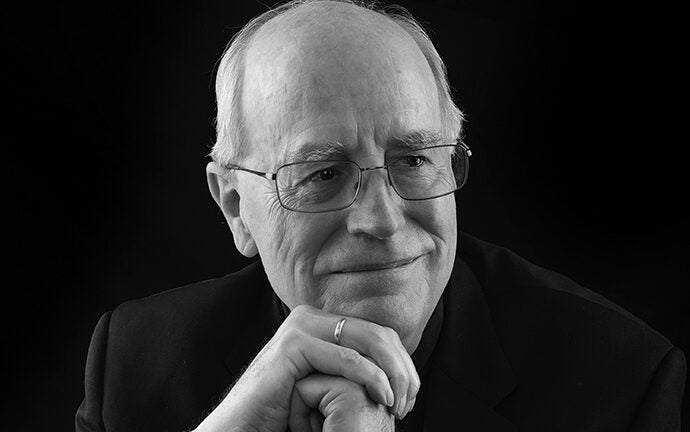
When James Heft was in second grade, an Ursuline nun at his Catholic school in Cleveland, Ohio, announced that non-Catholics would not go to heaven.
“I hit my fist on the desk, stood up, pointed at her and yelled, ‘That’s not true. My daddy is going to heaven.’ ”
Heft, Alton Brooks Professor of Religion and president of the Institute for Advanced Catholic Studies (IACS) at USC Dornsife, grew up with a Catholic mother and a Protestant father who worked for a beloved Jewish employer.
“That experience of love, relationship and goodness, not only with my father, but also with his employer and others, shaped my upbringing,” Heft said. “But it wasn’t until many years later that I began to realize the influence that religious pluralism had on how I thought about things.”
These ideas have continued to shape Heft’s spiritual and academic journey — a journey that led him to form IACS in 2004. Two years later, he brought the institute to USC Dornsife, where he fully developed its mission of creating an international network of scholars to explore religion through dialogue, research and publications.
“We’ve done some first-rate research that has resulted in a number of publications around the importance of interreligious dialogue between Muslims, Jews, Christians, Hindus, Buddhists, and others,” Heft said. “We’ve also created a stellar series of publications on economics and Catholic social teaching with Oxford University Press.”
Heft is now leading the drive to raise a $45 million endowment to fund an international residential research center to explore 2,000 years of rich Catholic intellectual and spiritual traditions.
“There is no area that would be out of bounds in terms of the research we support because Catholic is, well, catholic. It’s universal,” Heft said. “I’m not interested in whether the scholars are liberal or conservative, Catholic or from another religious tradition. I just want to create a place for exceptional scholars to do serious research on these kinds of ideas and topics. If we were afraid of where the chips will fall, I don’t think the institute’s research would deserve respect.”
In this 60-Second Seminar, Father Heft discusses feminism as it relates to the Catholic Church.
In April, Heft will travel to Rome at the invitation of the Vatican to host an international conference for the 25th anniversary of John Paul II’s 1991 encyclical Centesimus annus (The Hundredth Year), written following the collapse of the Soviet Union about capital, labor and Catholic social teaching.
This will be the second conference IACS has hosted at the Vatican: In 2010, Heft chaired an international symposium on Pope Benedict XVI’s encyclical Caritas in veritate (Love in Truth) and how it applies to the United States.
Heft joined the Marianists in 1961 and was ordained a priest in that order in 1973. He described his decision to join the religious order as, “More like the dawn than a lightning bolt. I ran out of good reasons against it.”
By then he had already earned his undergraduate degree in philosophy and education at the University of Dayton in Ohio and was a graduate student in philosophy at Georgetown University. He taught religion and English in Cincinnati, Ohio, high schools for three years. During the political and social upheaval of the late ’60s, he served for two years as a director of youth programs at a newly founded ecumenical center.
At the time, Heft was involved in the Civil Rights Movement. He organized retreats, led by black students, for white suburban students. “I never turned into a radical, but I began to see racism as a deep cancer. I call it ‘America’s original sin.’
“I was also doing draft counseling,” he said, “helping Catholics understand that their own religious tradition has something to say about conscientious objection as an option for those who objected to the Vietnam War.”
In 1977, Heft earned a Ph.D. in history and theology from the University of Toronto in Canada. His dissertation examined the historical origins of the doctrine of papal infallibility — a study of the first third of the 14th century.
He then began a 30-year teaching career at the University of Dayton, serving six years as chair of the theology department, eight as provost and 10 as chancellor.
A former chair of the Association of Catholic Colleges and Universities, Heft has written and edited 12 books and nearly 200 book chapters and articles. In 2011, he was honored with the Theodore Hesburgh Award for long and distinguished service to Catholic higher education.
If not the priesthood, Heft said he would have gone into medicine, law or teaching. “But what I’m doing allows me to teach, heal and explore basic truths — you could consider them laws — so I feel I gave up nothing.”
His greatest spiritual and academic satisfaction? “To see a light go on in someone, or experience a light going on inside myself.”
Read more stories from USC Dornsife Magazine‘s Fall 2015-Winter 2016 issue >>